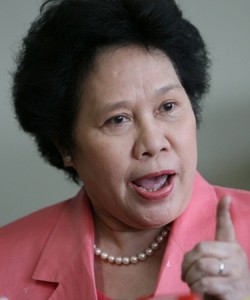‘Limited force’ could be used to rescue Filipinos in Sabah, says Santiago
MANILA, Philippines —The Philippines may use “limited force” against Malaysia if the lives of Filipinos caught in the middle of a violent dispute in Sabah are in danger, Senator Miriam Defensor-Santiago said on Friday.
While the use of law is prohibited under international law, Santiago said there are certain conditions that allow a state to use a “limited force” to protect and save the lives of its nationals.
“International law prohibits the use of force. But there is an unwritten exception which allows states to protect or rescue their nationals by means of armed forces in the territory of another state,” she said before the annual convention of the Association of Nursing Service Administrators Philippines held at the Manila Hotel.
“However, this exception should not be invoked, unless the Philippines has to carry out rescue operations,” said Santiago, a judge-elect at the International Criminal Court.
Santiago said among the pre-conditions that the Philippine must first observe before undertaking rescue operations in Malaysia are the following:
- The lives of Filipino nationals should be genuinely in danger
- Malaysia is unwilling or unable to ensure the safety of the persons concerned
- The Philippines does not pursue any other purpose at the occasion of the operation
- The scale and effects of the military force used are adequately measured to the purpose and conditions of the operation.
Asked later during a press conference if the present situation in Sabah warrants the Philippines’ use of a limited force against Malaysian authorities, Santiago said, “ According to the preconditions that are available, then the Philippines could go to war in a limited sense as long as these preconditions are met…”
Article continues after this advertisement“So as long as we meet these conditions under international law, we can avail of the exemption that allows us to use limited force to rescue Filipinos. We should have rescue operations there if the Filipinos are in danger of losing their lives,” she said.
Article continues after this advertisementUnder international law, Santiago said, the states in conflict with each other must avail only peaceful means of settlements of dispute.
“Meaning to say that war is considered illegal under international law for proving that a state has the right of sovereignty over a certain territory…That of course applies to the dispute in Sabah by the Philippines and Malaysia,” she pointed out.
But the senator pointed out how Malaysia stood firm in sending first Filipinos out of Sabah before discussing any means of settlement to end the dispute.
This attitude by Malaysia, she said, was not approved by the international law.
“That’s is not provided for by international law. If Malaysia insists that first Filipinos should all get out of Sabah then it will be willing to discuss any means of settlement of dispute, I’m afraid that Malaysia will be in danger of being branded as a rouge state by the international community. That behavior is not anticipated and is not approved of by international law,” she said.
But before the Philippines takes any action against Malaysia, Santiago proposed the appointment of a third-party that would investigate the recent spate of violence in Sabah.
When Congress opens in July, the senator said she would file a resolution expressing the sense of the Senate that President Benigno Aquino III should invite Malaysia to agree to an investigation by a third-party.
Santiago said the third-party could be a former prime minister or president of Southeast Asian Nations.
